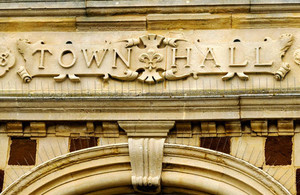New rules to strengthen standards for councillors and mayors
Local Government Minister sets out plans to strengthen rules to prevent anyone found guilty of serious crimes from serving on local councils.

Town Hall
Local Government Minister Marcus Jones has today (18 September 2017) set out plans to strengthen rules to prevent anyone found guilty of serious crimes from serving on local councils.
Under the planned changes to criteria, it would ensure those who represent their communities are held to the highest possible standards.
Current rules make clear that anyone convicted of an offence carrying a prison sentence of more than 3 months is banned from serving as a local councillor.
However, Mr Jones said that while this may have prevented criminals from becoming councillors, it does not reflect modern sentencing practices.
New rules could mean anyone given an Anti Social Behaviour Injunction, a Criminal Behaviour Order or added to the sex offenders’ register, would no longer be able to hold elected office in their communities.
Local Government Minister Marcus Jones said:
Councillors hold an important position of trust and authority in communities across England. We need to hold them to the highest possible standards.
The current rules are letting residents and councils down by not preventing people who should never be considered for such roles from standing for election.
The changes the government is proposing would help make sure anyone convicted of a serious crime, regardless of whether it comes with a custodial sentence, will not be able to serve as a councillor.
Changes to reflect modern day sentencing
Current barriers to becoming a councillor include being employed by the authority, being subject to a bankruptcy order or being convicted of an offence resulting in a prison sentence.
These restrictions were implemented in 1972, before the sex offenders register or other non-custodial orders existed. The new proposed measures would bring rules much more into the present day by including the alternatives to a prison sentence also becoming a barrier to being a councillor.
They would apply to councillors and mayors in parish, town, local, county and unitary councils, combined authorities and the Greater London Authority.
It would mean a ban on standing to be elected or if once elected a councillor was subsequently convicted of a serious offence, that resulted in an Anti Social Behaviour Injunction, a Criminal Behaviour Order or being on the sex offenders’ register, being forced to step down.
The changes would better reflect rules governing standards of MPs, where members face suspension from the House for anything that contravenes the parliamentary code of conduct.
Further information
The government is now asking councils and communities for their views on the proposed changes. The consultation is available until 5pm on 8 December 2017.
Office address and general enquiries
2 Marsham StreetLondon
SW1P 4DF
Contact form https://www.gov.uk/gui...
General enquiries: please use this number if you are a member of the public 030 3444 0000
If your enquiry is related to COVID-19 please check our guidance page first before you contact us - https://www.gov.uk/guidance/coronavirus-covid-19-guidance-for-local-government.
If you still need to contact us please use the contact form above to get in touch, because of coronavirus (COVID-19). If you send it by post it will not receive a reply within normal timescale.
Media enquiries
Email newsdesk@communities.gov.uk
Please use this number if you are a journalist wishing to speak to Press Office 0303 444 1209
Social media - MHCLG
Twitter - https://twitter.com/mhclg
Flickr - http://www.flickr.com/photos/mhclg
LinkedIn - http://www.linkedin.com/company/mhclg